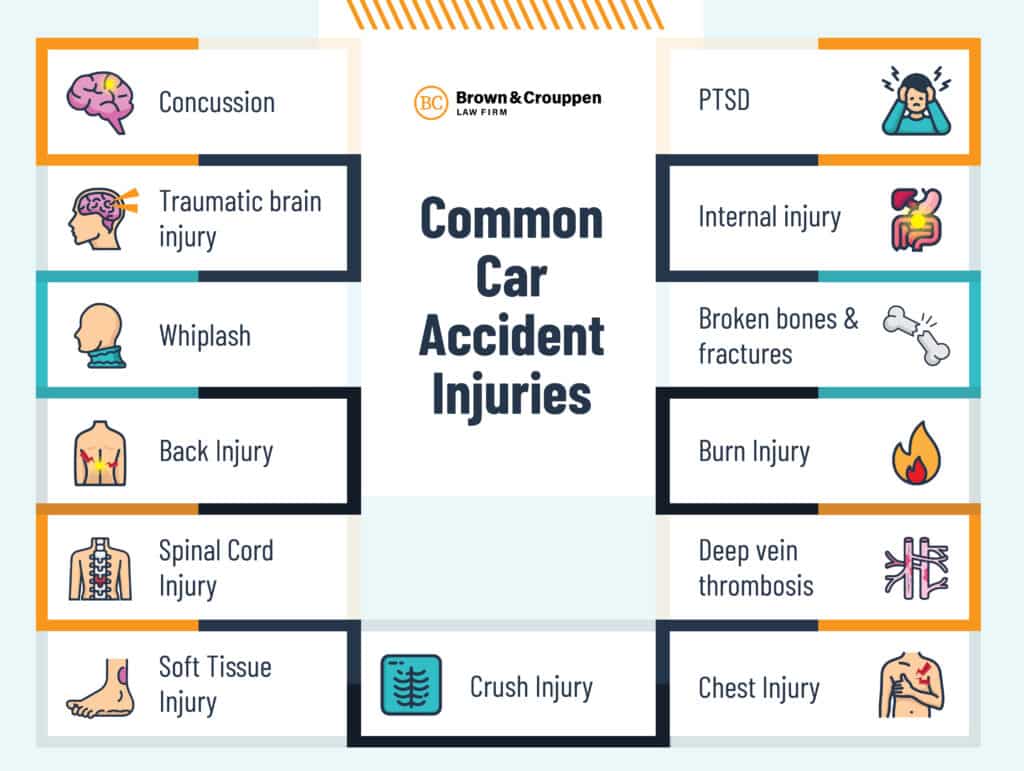Home Practice Areas
Auto Accidents
Common Car Accident Injuries
COMMON CAR ACCIDENT INJURIES
This page has been written, edited, and reviewed by a team of legal writers following our comprehensive editorial guidelines. This page was approved by Founding Partner, Terry Crouppen who has more than 40 years of legal experience as a personal injury attorney. Our last modified date shows when this page was last reviewed.
This page has been written, edited, and reviewed by a team of legal writers following our comprehensive editorial guidelines. This page was approved by Founding Partner, Terry Crouppen who has more than 40 years of legal experience as a personal injury attorney. Our last modified date shows when this page was last reviewed.
- Last Modified:
- March 19, 2024
The force of impact from a car accident can cause a wide range of injuries, from moderate bruising to severe fractures and traumatic brain injuries. Speak with an experienced car accident lawyer near you to learn about your legal rights for financial recovery.
Injuries stemming from car accidents can be relatively mild or long-lasting. Here’s a breakdown of the injuries that car accident victims tend to suffer most often.

CONCUSSION
Concussions are one of the most common car accident injuries, occurring in roughly one out of every 61 tow-away crashes. A type of traumatic brain injury, a concussion occurs when you suffer a sudden blow to the head, which causes the brain to move and make contact with the hard bone of the skull. A concussion may or may not result in a loss of consciousness.
TRAUMATIC BRAIN INJURY
A traumatic brain injury is defined as an impairment to the brain resulting from a bump, blow, or jolt to the head. Traumatic brain injuries fall into one of three categories—mild, moderate, and severe—based on the extent of the symptoms and the amount of time a victim loses consciousness.
When you are involved in a car accident, your head can hit the windshield, window, another hard object in or near the car, or the pavement if you are ejected from the vehicle. This hard hit can cause bruising, bleeding, and other damage inside the brain. Objects and debris can also potentially penetrate the skull and pierce the brain itself, causing extensive damage.
WHIPLASH
Whiplash is the most commonly reported car accident injury. It is estimated that over 2 million Americans suffer whiplash in car accidents across the nation every year. Whiplash occurs when your neck and head are involved in a whiplike motion. Your head moves forward rapidly while your body remains constrained by the seat belt. Your neck overextends forward, then whips backward violently. This violent motion can cause serious damage to nerves and muscles in your upper back and neck, as well as trauma to vertebrae in your spinal column.
NECK INJURY
Not all car accident-related neck injuries involve whiplash. The trauma of a car crash can also cause fractures, herniated discs in the neck, cuts and lacerations, and facet joint injuries as well as strains and other soft tissue damage.
BACK INJURY
Back and neck injuries are often interrelated, given that the spinal column begins at the base of the skull and runs down the back to the tailbone. Often, trauma to the neck or back (or vice versa) can result in similar injuries and trauma. Some commonly reported back injuries include back sprains and back strains, spondylolisthesis, lumbar fractures, thoracic fractures, cervical fractures, compression fractures, herniated discs, and muscle spasms.
SPINAL CORD INJURY
Research suggests that car accidents are a leading cause of spinal cord injuries, accounting for around 40 percent of all reported conditions. Since the spinal cord plays a key role in coordinating the brain and body, trauma from a car accident can have immediate and lifelong consequences. Depending on the level of the injury (which part of the spinal column is affected), victims may experience limited mobility to full-fledged paralysis.
SOFT TISSUE INJURY
Whether you are involved in a high-speed collision or a slow-moving fender bender, the impact of a crash can cause the soft tissues in your body to stretch, flex, and extend beyond their normal range of motion.
This can result in serious soft tissue injuries including:
- Sprains: stretched or torn ligaments/muscle
- Strains: stretched or torn tendons/muscle
- Contusions: bruising
- Tendonitis: inflammation of a tendon
- Bursitis: inflammation of fluid-filled sacs in a joint
Since soft tissue injuries can occur even in moderate conditions, they are among the most commonly reported types of crash-related trauma.
CRUSH INJURY
In a serious car accident, victims can become crushed by a vehicle or by the weight of their own car when it is damaged. Forcible pressure on the body can cause a host of serious adverse health events, including restricted blood flow, internal organ damage, internal bleeding, fractures, and nerve injury.
CHEST INJURY
Research suggests that around 80 percent of all car accident victims who suffer severe injuries are hurt in the head or chest. Age is specifically associated with an increased risk of sustaining a chest injury in a car accident. Some frequently reported chest injuries related to blunt force trauma from car accidents include broken ribs, internal organ damage, ruptured diaphragms, and puncture wounds (often related to fractured ribs).
DEEP VEIN THROMBOSIS
Deep vein thrombosis occurs when a blood clot originates in a vein, dislodges, and travels through the body toward the heart, brain, or lungs. If the clot reaches an organ, it can cause an embolism or stroke, which can be deadly. Deep vein thrombosis can be a complication related to injuries and trauma suffered in a car accident, particularly for individuals who sustain severe injuries and are unable to move for extended periods.
BURN INJURY
Victims of car accidents can suffer severe debilitating burns. Common sources of exposure include fire, gas tank explosions, and scalding oil. Exposure to steam from a collision can also burn or singe the skin. Motorcyclists and bicyclists, in particular, can suffer a specific type of skin abrasion known as “road rash,” which mimics the symptoms and consequences of burn injuries.
BROKEN BONES AND FRACTURES
Blunt force trauma can cause one or more of the 206 bones in the body to fracture, or break, in a car accident. While any bone has the potential to fracture, research suggests that the femur, humerus, spine, skull, and ribs are most susceptible to breakage. Common breaks include transverse fractures, stable fractures, compound fractures, oblique fractures, and comminuted fractures.
INTERNAL INJURY
Organs and tissue can become severely damaged in a car accident. Typically, internal injuries and bleeding are secondary and related to chest injuries, crush injuries, and broken bones. Some commonly reported internal injuries include a ruptured spleen, kidney damage, liver damage, pneumothorax, ruptured abdominal aorta, and internal bleeding.
POST-TRAUMATIC STRESS DISORDER
Victims of car accidents aren’t just vulnerable to physical injuries. The trauma of being involved in a crash can take quite an emotional toll too. For some, post-traumatic stress disorder from an accident can lead to vehophobia. With vehophobia, victims of car accidents develop an almost paralyzing fear about driving or traveling in a car. This can lead to depression, anxiety, and withdrawal and can significantly impair a victim’s ability to live their normal life.
DELAYED SYMPTOMS AFTER CAR ACCIDENT
Sometimes, the signs and symptoms of car accident injuries won’t be evident right away. In some cases, they can take hours—or even days—to manifest. This can be true for any injury, including broken bones, internal bleeding, traumatic brain injuries, and other types of crash-related trauma. However, left untreated, an injury can worsen, cause secondary injuries, and even result in death.
That is why it is always best to seek medical treatment after a car accident, even if you feel fine. Undergoing a prompt medical evaluation can ensure that all your crash-related injuries are diagnosed and treated immediately. This can significantly reduce the risk of complications or death.
Be aware of the following signs or symptoms in the hours that follow a crash:
- Nausea
- Vomiting
- Abdominal pain
- Lightheadedness
- Dizziness
- Fatigue
- Restlessness
- Numbness or tingling in the extremities
- Confusion
- Agitation or anger
- Changes in emotional state or behavior
- Sweating or chills
- Changes in complexion
Anything unusual or out of the ordinary could be an indication that you have suffered an injury in your recent crash. Go to the emergency room or visit your primary care physician immediately to get checked out.

Get started with a free consultation with one of our skilled Personal Injury Lawyers today.
INJURED IN A CAR ACCIDENT? SCHEDULE A FREE CONSULTATION
You may have the right to recover compensation for your medical treatment, loss of income, and pain and suffering if you have been injured in a car accident. The experienced car accident attorneys at Brown & Crouppen P.C. can help you file a claim, stand up to the insurance company, and fight to maximize your financial award.
Since 1979, we have been leading advocates for crash victims and grieving families across the Midwest. Our top-rated trial attorneys have secured over $1 billion in settlements and verdicts for our clients. Now we are ready to help you get the best result in your car accident injury case.
Contact our award-winning personal injury law firm, with offices conveniently located in St. Louis, Kansas City, and throughout Missouri, to schedule your free consultation today.
FREE CASE EVALUATION
Our Results
TESTIMONIALS

- Last Modified:
- March 19, 2024
SCHEDULE A FREE CONSULTATION
